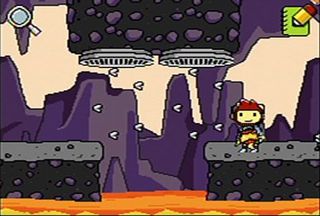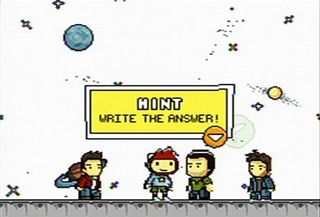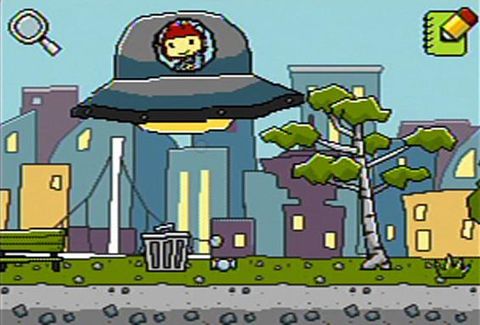Why you can trust GamesRadar+
Given our gushing over the game’s concept, you’d think we were ready to name Scribblenauts Game of the Year. But having played it beyond the first few levels, wenow are keenly aware of the game’s major flaws, which we’re obligated to point out for you here. Some of these problems are inherent flaws with the game’s concept, but too many more come from poor execution of the game’s mechanics.
We’ll refrain from critiquing the game’s overall design too much, because your appreciation of it will have a lot to do with your individual play style. Turns out, we’re less fond of engineering elaborate and creative solutions to each puzzle than we thought we’d be – instead of creating a Rube Goldberg masterpiece for each stage, we often found ourselves using simple things like “jetpack” and “rope” in order to get ahead. (That combination got us through a pretty large chunk of the levels, too, by the way.) Yes, we know: the game rewards you in Ollars (in-game currency) if you push yourself to come up with new objects, but it also rewards you for not using too many objects, and a jetpack is pretty much one-stop-shopping.

Above: “Well, I could engineer a rope bridge out of some glue and string, or..."
You only really have to stretch your mind if you're replaying the levels for full completion (you're challenged to complete the same level three times without repeating any objects), but we found ourselves losing interest pretty quickly. Still, if you’re an engineer-type who values creativity over pragmatism (read: if you don’t intend to just use the jetpack all the time), you should still know that, as much as you’ll go nuts with Scribblenauts, you’ll still have to deal with some other irritating game mechanics.
The interface for interacting with objects is simple but unforgivably clunky. You tell Maxwell to go to a location by tapping it – he’ll jump over small gaps automatically, but unfortunately, he won’t stop moving forward even if continuing means jumping into a pool of deadly lava. You frequently have to tap summoned items that are far away in order to interact with them, or drag them around to attach them to other objects. Far too many times, we’d try to tap an object but miss slightly, which the game interpreted as us commanding Maxwell to go to where we tapped. Let’s just say that words came out of our mouths after our sixteen-billionth accidental lava-induced death that would not be picked up by any polite speech-recognition device.
Too often, the puzzles adhere to the same sort of archaic trial-and-error philosophy of a bad point-and-click adventure: later levels feel more like you’re trying to guess the intentions of the developers, rather than coming up with your own creative solutions. Scribblenauts and classic point-and-click adventures both suffer from overly ambiguous in-game hints, but at least in Scribblenauts, you can summon up little sprite versions of the developers and drop elephants on them to vent your frustration.

Above: That’s your hint? Someone is definitely getting an elephant to the face for this one
In the end, we came away from Scribblenauts wondering if we had missed the point. There were a few puzzles with satisfyingly original solutions, but instead of feeling empowered by the freedom to write anything we wanted, we felt more confined by the limitations of core mechanic and the game’s lousy controls. If the developers had come up with more elegant puzzles (i.e., ones that can’t be solved with jetpacks) and given us the option to control Maxwell with the d-pad or face buttons, we’d be able to recommend Scribblenauts to everyone. As it stands, only patient gamers with a love of creative engineering will be able to overlook its design flaws and enjoy it for the unique and innovative game that it is.
Sep 15, 2009
More info
| Genre | Puzzle |
| Description | While there are a few puzzles with satisfyingly original solutions, the freedom to write anything you want is outweighed by the limitations of the core mechanic and the lousy controls. |
| Platform | "DS" |
| US censor rating | "Everyone 10+" |
| UK censor rating | "" |
| Release date | 1 January 1970 (US), 1 January 1970 (UK) |

Atlas director teases influences behind the Jennifer Lopez-led sci-fi movie, from Titanfall to Castaway

Alien TV show confirms its place on the franchise timeline as Foundation star joins the cast

Valheim's massive new Ashlands update gives the survival RPG its "most challenging biome yet" plus raid-like sieges and new endgame weapons
